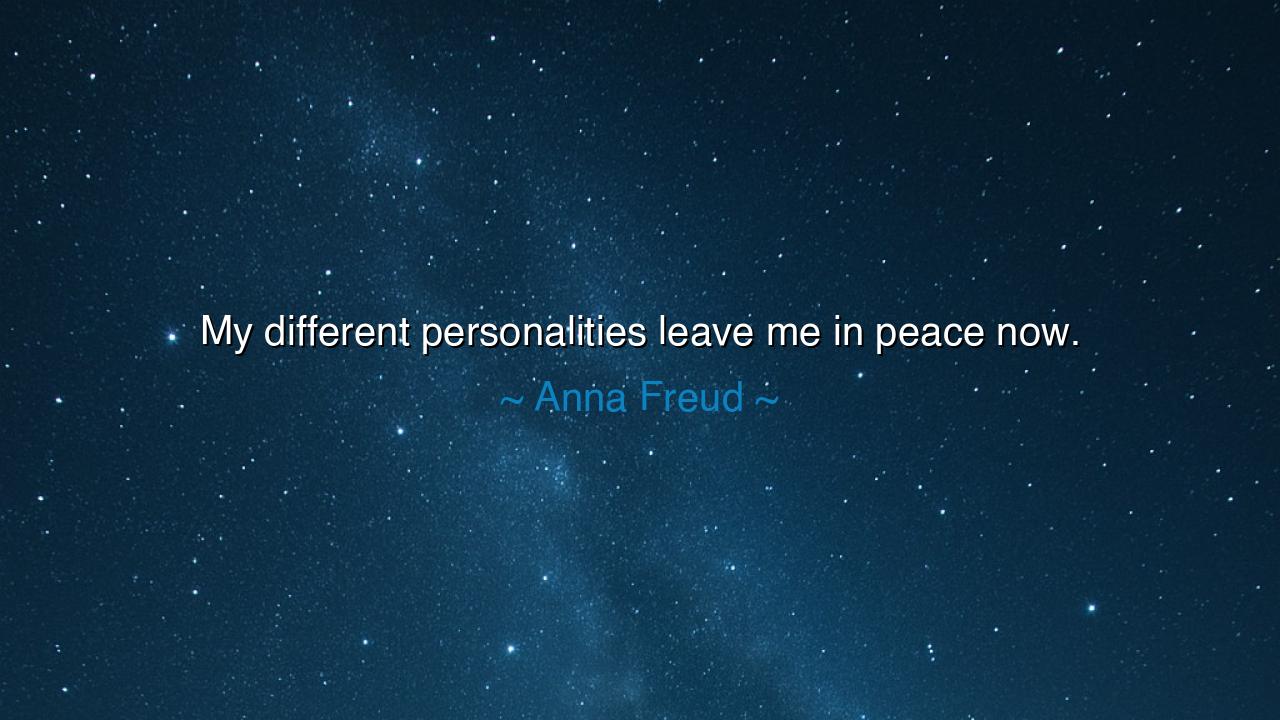
My different personalities leave me in peace now.






Hear the quiet yet profound confession of Anna Freud, daughter of Sigmund Freud and pioneer of psychoanalysis: “My different personalities leave me in peace now.” In these few words, she reveals the lifelong struggle of the human heart with its inner divisions, and the rare blessing of reconciliation. For every soul carries within itself a chorus of voices—dutiful self, fearful self, ambitious self, wounded self—and these voices, when in conflict, tear us in many directions. Yet there comes a time, if one is faithful to the work of understanding and acceptance, when the quarrel ends, and peace descends upon the inner world.
The meaning of her words is not that she lost her different selves, nor that she silenced them, but that she made peace with them. The child within her, the daughter of her great father, the professional analyst, the caretaker, the vulnerable woman—all of these once battled for dominance. But now, she says, they leave her in peace. She has reached a unity, not by destroying difference, but by embracing it. In this, she teaches us that wholeness is not uniformity, but harmony.
The origin of these words can be found in her lifelong devotion to the science of the mind. Anna Freud, inheritor of her father’s legacy, deepened psychoanalytic theory, especially concerning children. She understood better than most the turbulence of inner life, how desires, defenses, and identities clash within us. To arrive at a place of peace, after a life of such scrutiny, is no small triumph. It is the victory of self-knowledge, the calm that comes when shadows are no longer feared, but welcomed as part of the whole.
History offers us parallels. Consider the life of Mahatma Gandhi, who called his autobiography The Story of My Experiments with Truth. Gandhi was lawyer, ascetic, leader, husband, father, reformer—a man of many selves. Early in life, these roles clashed; he was restless, uncertain. But through years of discipline, prayer, and struggle, he found integration. His different selves became one, and in that unity he found peace enough to lead a nation. Like Anna Freud, he discovered that the battle within must be resolved before the battle without can ever be won.
Her words also echo the wisdom of the ancients, who spoke of the soul as a city. Plato likened it to a republic of reason, spirit, and desire. When these parts war with one another, chaos reigns within. But when they are ordered in harmony, the soul becomes just and tranquil. Anna Freud’s saying is a modern echo of this timeless truth: peace is not found by eliminating the voices within, but by reconciling them under a higher harmony.
The lesson for us all is simple yet profound: if you would find peace, you must first make peace within yourself. Do not despise your contradictions. Do not deny your different roles—parent and child, worker and dreamer, weak and strong. Instead, honor them, understand them, and learn to let them dwell together without strife. When you cease to fight yourself, you will cease to be at war with the world.
Practically, this means cultivating self-knowledge through reflection, journaling, meditation, or counsel. It means forgiving yourself for your inconsistencies, and seeing them as part of the human condition. It means practicing patience with your own growth, knowing that integration is slow. And above all, it means embracing compassion—for the child you were, for the adult you are, and for the soul you are becoming.
So I say to you, O seekers of tomorrow: remember Anna Freud’s words. Your different personalities can leave you in peace, if you learn to welcome them as guests in the same house. Do not fear them, nor exile them, but gather them into harmony. For the human soul is not a battlefield, but a symphony waiting to be tuned. And when at last you achieve that inner peace, you will discover that the greatest freedom is not escape from the self, but reconciliation with it.






MCHang Minh Chau
Anna Freud’s reflection on her different personalities leaving her in peace raises an important question about self-identity. Is peace achieved when we reconcile our inner contradictions? Can someone really be at peace with their complexities, or does it require a deep understanding of why these various personalities exist in the first place? It seems like Freud is offering a powerful lesson in embracing the full spectrum of ourselves, but how do we begin that process?
TPLuu Trung Phong
This quote from Anna Freud strikes me as a powerful exploration of self-acceptance. By acknowledging and integrating different aspects of her personality, it seems that Freud was able to find a sense of peace. But what happens when the different parts of us clash, or when we feel fragmented? Can peace still be attained, or is it a constant struggle to bring all parts into harmony? I’d love to explore how this idea plays out in daily life.
8STruong Gia Bao 8/1 stt6
I find it fascinating that Anna Freud speaks of peace through her various personalities. It suggests a level of self-acceptance that’s rare in today’s world, where many people struggle with their inner conflicts. Could it be that embracing all parts of ourselves—both the strengths and the flaws—can lead to greater personal peace? I wonder if we all could benefit from seeing our complexities not as obstacles, but as sources of strength.
Ttdcp
Anna Freud’s statement about her different personalities leaving her in peace is both intriguing and complex. It makes me wonder if embracing different facets of oneself can actually lead to inner harmony. But does this mean that these ‘personalities’ were once in conflict? Is true peace found in accepting all parts of ourselves, even the ones we might try to suppress or deny? How does this idea of integration fit into the broader concept of mental health?